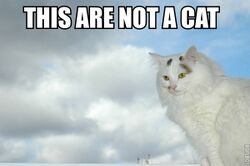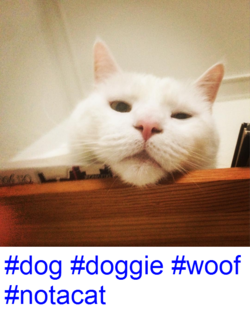Aboutness
Aboutness is a weird and often misunderstood concept in library science[1]. Aboutness is about what things are about, about what about means. In other words, it's about what about is all about - a bout of aboutness. OK, moving on... Aboutness is the idea of describing information or data in the best way possible. Ever tried writing "strawberry marmalade" on a piece of paper and attached it to a jar of marmalade? Well, that was aboutness you just tried right there. Now, if the jar was raspberry marmalade you might have messed up and misunderstood aboutness. But still, you tried to decribe the jar in a way that would fit the content. Figuring out the best way to describe marmalade takes about twice as long as it takes to eat the whole jar. Now, aboutness has gone through many phases and has been discussed by many important scientists during the years. Most of these discussions have ended it total confusion. It has turned big strong men into weaklings, and has been the cause of many discussions on logics and semantics. Why? Because nobody knows what it is about.
What it is[edit]

“A rose is a rose is a rose is... A flower?”
Aboutness has been discussed by scientists and artists and other redundant people for ages. It is deeply rooted in semantics and involves the logical, or illogical nature of words and what they mean. The leap between word and meaning is often a giant leap for mankind - a bit like walking on the moon or something. It is deeply philosophical issue, that made Aristotle scratch his beard, made Bertrand Russell take long drags on his pipe, and made Ludwig Wittgenstein even more confused. To truly grasp aboutness, it is necessary to split words and their meaning up in two categories:
- What the thing is of - the ofness
- What the thing is about - the aboutness
Now, ofness is pretty simple - a cucumber can come from a farm - or in other words, it is of a farm. It is not about a farm, as the farm does not describe the cucumber itself. This is where aboutness steps in and shows its pretty face. If we describe the cucumber as green and tasty, we have described what the cucumber is about. Simple, right? Well, marmalade and cucumbers has been covered so far. You may have becomed hungry by own, and yes, aboutness does that to you. So what's so complicated about aboutness? What is the fuss about? Why so much ado about nothing? Well, the complexity comes when we are trying to describe something more complicated than a cucumber. No, not tomatos. Really complicated stuff. Really smart and sophisticated stuff. Like... you know, stuff in books.
What it does[edit]
When we focus on aboutness rather than ofness, it means that we can use logical deduction and peel away meaningless information - If we stick with the cucumber, we can assign tags to the cucumber, much like when you upload an Instagram image and tag it with words. If we stick to aboutness and forget the ofness, we can describe it as green, long, ripe and tasty. Or sex toy, but that's a whole other story[2]. The main idea is that the object we're looking at is described in a way, that fits the object and not the thing around it. Remember, if we used ofness to describe it, we would have to describe it as stuck to my teeth as I'm eating it, and that's not very relevant is it?
Aboutness can be seen as a clarification, that makes data or information more clear and easily retrieved. Aboutness does that to information, and it makes aboutness a logical necessity. What is a logical necessity, then? Something we can't ignore, no matter how we try. Ever heard of climate change, Donald? Yeah, that kind of logical necessity.
Tagging in social media[edit]
Ironically, a lot of people grasp the concept of aboutness but not the word itself. When people photograph their cats and upload it to social media, they usually tag it accordingly. Well, they try to. The best way to describe something online is by tagging it, and indeed, hundreds of thousands of terrabytes is spent on pointless cat photos and even more pointless tagging. We're living in the information age, and it's all wasted on little furry cats.
Aboutness is important when it comes to metadata on stuff you find online - pornography, cat photos, more pornography - as it is important when it comes to leading the user into the piece of information he, she or it is looking for. Obviously, sometimes things go wrong, and things will become random or incoherent easily. It is easy to describe something simple like a cucumber[3], but kind of hard when we're talking about complex and incomprehensible subject such as tax legislation, abstract art or Donald Trump's haircut. How do we describe it in simple words? We don't, and thus, aboutness becomes a difficult dicipline. Aristotle scratched his beard again, Bertrand Russell took another drag on his pipe, and Ludwig Wittgenstein gave up philosophy and got a life.
What it is good for[edit]
“Aboutness! What is it good for? Absolutely nothing”
It's mostly good for nothing, but it is used in information management, indexing, cataloging and other diciplines that only geeks and retired librarians know about. In the field of metadata, aboutness is very important as there is usually an overload of data, and it needs to be sorted out. That's why data farmers weed out the bad data that doesn't say anything about the data. This almost meant that Data was written out of Star Trek several times during the production.
Aboutness has been a great help for confused people, who don't what stuff is all about. People who see movie posters will ask: "What's it about?" and some clever people will say: "It's a dreadful movie about big, big robots smashing up stuff with no plot or meaning whatsoever". If we didn't have aboutness, we wouldn't be able to describe the world around us in a proper way, and people whould say weird stuff like: "My rabbit is minuscule and red". Not the best way to communicate.
Examples of how aboutness is used[edit]
- When you need to know what is inside the box, you can ask some smart people and they will tell. You don't even have to look!
- When you Google stuff, and Google actually gives you what you were looking for (happens about 0,7% of the time)
- When you have a massive book collection of pulp fiction and you need an index that tells you whether the trash novel is about crime, romance, UFOs or all three at once
- When you wish upon a star, makes no difference who you are. Anything your heart desires will come to you.


